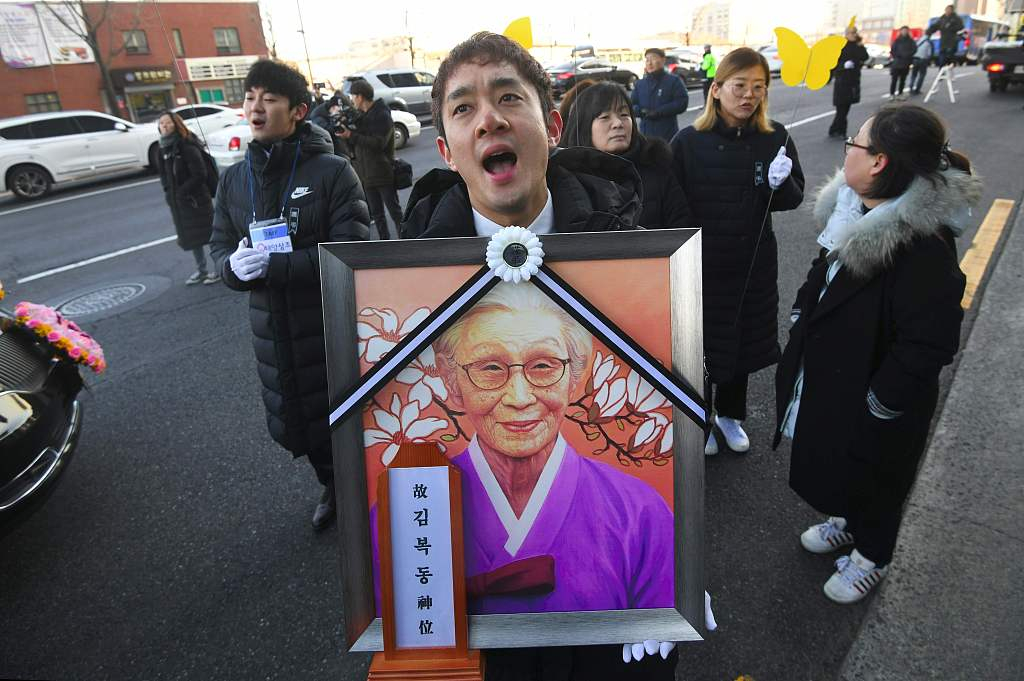

Editor's note: Chris Deacon is a postgraduate researcher in politics and international relations at the University of London and previously worked as an international commercial lawyer. The article reflects the author's views, and not necessarily those of CGTN.
In the past week, an angry disagreement has erupted in the Japanese prefecture of Aichi regarding a "comfort woman" statue on display at an arts festival at a Nagoya venue. The mayor of Nagoya demanded that the statue be removed, resulting in immediate criticism from the governor of Aichi for his act of "censorship."
The "comfort women" euphemism is commonly used to refer to women who were forced to provide sex to Japanese soldiers during the Pacific War. The issue still causes tensions between Japan and its wartime victims in Asia and is a particularly common source of disputes with the Republic of Korea (ROK).
Several civil society and activist groups continually pursue the issue, ostensibly seeking to raise awareness of the plight of the victims, as well as seeking certain measures from the Japanese government relating to admission of guilt and the awarding of recompense to the living victims.
Part of these efforts has included the erecting and maintenance of statues of comfort women in various locations. Perhaps the most famous of these is situated directly outside the Japanese embassy in Seoul; but others, for example in the United States, consistently cause diplomatic spats between Japan and the ROK.
The arts festival concerned aimed to show multiple works that had been banned from other venues and was entitled "After Freedom of Expression?". In many ways, therefore, the sentiment that the piece provoked vindicated the curators' aims. Controversy caused by the public criticism of the exhibition – including from the Nagoya mayor – resulted in the cancellation on grounds of public safety. It was feared that some form of violent attack could result were it to go ahead.
The mayor's initial objection, however, was only that the sculpture would "trample on the feelings of Japanese." This comment exemplifies the precise issue with which Japan still grapples, much to the chagrin of victims' movements.

Mourners holding a portrait of former South Korean "comfort woman" Kim Bok-dong, who was forced to serve as a sex slave for Japanese troops during World War II, shout in front of the Japanese embassy during a funeral ceremony of Kim in Seoul on Feb. 1, 2019. /VCG Photo
Were an exhibition to contain specific details about the "comfort women" issue – such as statistics or historical commentary – regarding which, with a basis in evidence, objections were raised, criticism might be legitimate. But to simply object to the existence of a statue which does nothing more than symbolize the basic existence of these women is deeply concerning.
Comparisons of such cases are far from straightforward, but we can imagine, for example, that German objections to the existence of a Holocaust memorial on the grounds of the nation's "feelings" would be unthinkable. Indeed, even in the case of Japan, memorials for the atomic bombings in Hiroshima and Nagasaki are not thought to "trample on the feelings" of the United States.
On the contrary, they are symbols of terrible things that have happened in our recent history, which act as touchstones for society's collective memory such that we might never make the same mistakes again. Indeed, this is precisely the sentiment the memorial situated in Hiroshima's Peace Park expresses.
Episodes such as the Nagoya affair put into context the frequent expressions of anger and incredulity that emerge from the ROK, among other nations, regarding Japan's treatment of its wartime history. Without doubt, at times political games can be played, cynically using this history for ulterior purposes – but no one can claim that the Koreans (and, indeed, Chinese and others in Asia) do not have a point.
Calls for never-ending apologies and the re-hashing of agreements "settling" some of these historical issues may sometimes be misguided; but as long as high-profile members of Japanese society – particularly those in political office – continue to express a total rejection of even acknowledging this history, what progress can be made to move past it?
These are more pertinent than ever discussions to have when we consider the state of Japan-ROK relations and the driving force of historical issues behind the current nadir. Without doubt, these views do not represent the majority of Japanese, but more must be done to unequivocally condemn such comments when they are made.
One cannot accuse "Japan" or the Japanese government of supporting such revisionism if its objection to such views is clearly displayed. Such a policy of full and frank acceptance of the past – and rejection of sentiment to the contrary – is the only way that the mutual understanding necessary to achieve a more peaceful future will be possible.
(If you want to contribute and have specific expertise, please contact us at opinions@cgtn.com.)

Copyright © 2018 CGTN. Beijing ICP prepared NO.16065310-3
Copyright © 2018 CGTN. Beijing ICP prepared NO.16065310-3